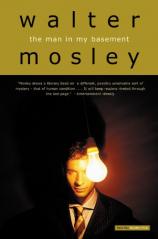Reading Group Guide
Discussion Questions
The Man in My Basement

1. Anniston Bennet's plan is shocking, and his only explanation: "I'm a criminal wishing to pay for my crimes" (page 120). What are Bennet's reasons for not recognizing the already existing channels of law enforcement? Why do you think he chooses this form of punishment instead? What does he hope to accomplish by serving time in Charles's basement?
2. Individual history can be a potent, lifelong force, this novel reminds us. What does Charles learn about his own history in the course of the novel? Does his estimation of one's history rise or fall?
3. Masks play a significant role within the narrative --- in both a literal and an abstract sense. Discuss the various masks that appear in the story. What do they hide? What do they reveal?
4. As the novel unfolds, Charles reads a story about a young prince. Explain the relevance of this particular story. How does this story reflect the way Charles views himself in the world?
5. Bethany and Narciss appeal to very different parts of Charles's nature --- one is passionate, the other more cere- bral. Yet the two women have something in common. As Charles notes, "Bethany and Narciss saw something that was like me --- an image of what I thought I wanted to be --- but they had no idea what was on my mind" (page 208). Discuss. What do Charles's respective relationships with these two women reveal about him?
6. Discuss Extine's role relative to those of Bethany and Narciss. What can be drawn from Charles's behavior during his encounters with Extine?
7. Early in the story, Charles makes an intriguing link between Bennet and his own uncle, Brent, a detail that resurfaces at various points in the novel. Why would Charles make this connection? What does this association suggest about Charles's state of mind?
8. Bennet and Charles's relationship challenges historical roles based on the color of one's skin. Why do you think these very distinct men are drawn to each other? Describe the way in which each man perceives the other.
9. Discuss the nature of the conversations between Bennet and Charles. How does the dynamic between them shift in the course of the novel?
10. The struggle between good and evil is a key theme in the conversations between Bennet and Charles. Initially how does Charles define the two? Does his perception change?
11. At one time Bennet declares, "I am a good citizen and the worst demon" (page 217). What does he mean by this? In view of Bennet's past, what do you think might be his idea of a true act of evil?
12. What crimes does Charles feel he has committed? Whom does he consider his "warden"?
13. Ultimately, Bennet and Charles construct unique prisons for themselves as punishments for apparent transgressions. Evaluate these prisons. How are they similar? How are they different?
14. At the end of his self-imposed sentence, Bennet writes in a letter, "I want to pass something on, but I can't think of a thing" (page 246). Discuss Bennet's influence on Charles's life. What has Bennet passed on, if anything?
15. Bennet has one final request for Charles, a request that Charles chooses not to honor. Examine Charles's motives for this. What does his choice suggest about Charles himself at the end of this story?
16. Do you think Bennet ultimately paid for his crime? Why or why not?
The Man in My Basement
- Publication Date: February 2, 2005
- Paperback: 249 pages
- Publisher: Back Bay Books
- ISBN-10: 031615931X
- ISBN-13: 9780316159319








